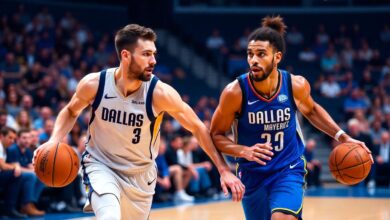Superstar Firepower and Bench Poise: Breaking Down Celtics vs Mavericks by the Numbers

In a high-stakes, nationally televised matchup that delivered both drama and data, the Boston Celtics outlasted the Dallas Mavericks in a game that showcased exactly why playoff basketball hinges not just on top-tier talent, but also on the quiet competence of a team’s second unit. When two MVP-caliber players in Jayson Tatum and Luka Dončić share the same floor, the spotlight naturally orbits their stat lines—but a closer look at the Celtics vs Mavericks match player stats reveals a game where the supporting cast wrote just as much of the story.
Contents
Tatum vs. Dončić: A Tale of Two Superstars
Let’s start with the headliners. Jayson Tatum finished the game with 31 points, 9 rebounds, and 6 assists on an efficient 11-of-20 shooting, including 4-of-8 from beyond the arc. He was composed and in control, picking his spots rather than forcing the issue. His +12 plus-minus led all starters, a testament to how Boston’s offense thrived with him orchestrating both on and off the ball.
On the other end, Luka Dončić tallied a herculean 35 points, 11 assists, and 7 rebounds. But his 12-of-27 shooting (3-of-10 from three) and 5 turnovers painted a picture of a superstar under siege. The Celtics’ defense, anchored by Jrue Holiday and bolstered by timely help from Derrick White, made Luka earn every bucket. He still got his numbers, but unlike Tatum, his efforts didn’t elevate the players around him consistently.
What separates stars from superstars is their ability to make others better. Tatum did just that with hockey assists, strong defensive switches, and calm floor leadership. Dončić, as brilliant as he was, seemed burdened—almost isolated in his responsibility to generate offense.
The Celtics’ Bench: Silent Execution, Loud Impact
Here’s where the numbers speak volumes. Boston’s bench outscored Dallas 28-14, with key contributions from Payton Pritchard (9 points, +7 in 15 minutes) and Sam Hauser (8 points, two threes that stopped Dallas runs cold). Al Horford, technically off the bench though playing starter-level minutes, added 10 rebounds and a block, acting as the defensive safety valve any championship team needs.
These aren’t gaudy stats, but they’re winning stats—momentum-killers, floor-spacers, and quiet possessions that keep a lead from slipping. Boston’s bench didn’t just hold the line; they extended it.
Dallas, in contrast, struggled mightily when Dončić sat. Tim Hardaway Jr. shot 2-of-9, and Jaden Hardy’s 3 turnovers in 12 minutes swung momentum in Boston’s favor. Outside of a brief burst from Maxi Kleber, the Mavericks got little in terms of shot creation or defensive disruption from their reserves.
Defensive Versatility: The Celtics’ Calling Card
Another stat to consider: Dallas shot just 42% from the field and committed 15 turnovers, many of them forced by a Celtics defense that thrives on length, communication, and switchability. Holiday, White, Tatum, and Brown formed a perimeter wall that disrupted passing lanes and funneled ball-handlers into contested midrange looks.
Boston, on the other hand, shot 47% and had just 9 turnovers—precisely the kind of clean execution that championship teams deliver on the road or against elite opponents. It wasn’t that the Celtics’ offense was overwhelming, but it was composed. They played mistake-free basketball in crunch time, and that mattered just as much as their scoring runs.
Brown’s Quiet Dominance
Jaylen Brown may not have led the scoring charts, but his 24 points on 9-of-17 shooting came in crucial stretches. He attacked mismatches, pushed pace in transition, and forced the Mavericks’ defense to stay honest. More than that, Brown’s physicality on defense—particularly against Dallas’ wings—helped limit secondary scoring options.
His +9 plus-minus mirrored his impact: not flashy, but fundamental.
The Coaching Factor
Joe Mazzulla’s rotations deserve credit. He trusted his bench in key minutes and didn’t overextend his starters. His decision to go small with Tatum at the four unlocked better spacing and exposed Dallas’ slower-footed bigs. Meanwhile, Jason Kidd leaned heavily on his stars, but the lack of offensive variety in bench units left the Mavericks too predictable when Dončić or Irving weren’t initiating.
Irving’s Inconsistency
Kyrie Irving, the X-factor for Dallas, had an off night: 18 points on 6-of-18 shooting, with just 2 assists. The Celtics dared him to shoot over length and closed off his driving lanes. When Kyrie’s creativity is stifled, Dallas becomes a one-dimensional team. The Celtics exposed that in the second half, turning his isolation possessions into contested fadeaways rather than clean looks.
Final Thoughts: Depth Wins in the Details
When analyzing the Celtics vs Mavericks match player stats, the theme is clear: superstar talent sets the ceiling, but depth and execution set the floor. Boston’s core four of Tatum, Brown, White, and Holiday did what was expected—but their role players did what was necessary.
Dallas, despite another brilliant effort from Luka Dončić, was ultimately undone by limited bench production and a Celtics defense that forced difficult decisions on every possession.
In a postseason-like atmosphere, Boston looked every bit the title contender: not just because of their stars, but because of the system and the players around them. In a league where every possession matters, the Celtics showed that balance and depth are still the best recipe for winning basketball.





